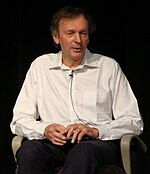
The quest for the edge of evolutionary theory has been pursued by many. Often they conclude that morality - or some other aspect of human nature is "beyond the edge of evolution".
My search for the limits of Darwinism is a bit different. It's obvious that Darwin's theory of evolution covers all living things. However, it is now also now clear that the same theory applies to a range of inorganic systems - drainage systems, propagating cracks, electrical discharges - and so on. I discuss this in more detail in various places - including:
So: what are the limits of evolutionary theory? One solution is to have a theory that covers all change. I've briefly discussed this possibility in:
Such a complete theory of evolution has also been proposed by Nathalie Gontier. However, notoriously a theory that predicts
anything also predicts
nothing. This is not
necessarily a fatal flaw - Turing's theory of computers applied to the universe in the form of
the Church, Turing, Deutsch principle also predicts nothing. However, not making concrete predictions is not a very positive feature. This motivates the search for more easily falsifiable evolutionary theories.
Evolutionary theory usually involves a reproducing population undergoing mutations and subject to selection. However, this leaves open the issue of what counts as a "population", what a "mutation" is and what qualifies as "selection".
Mutations
One classical way of constraining the predictions of evolutionary theory is to insist that
mutation occurs at random.
Obviously unconstrained variation can't be permitted - since otherwise you can explain any form of change by saying:
"that's just a macromutation". Random mutations represents the opposite extreme.
The problem with the "random mutations" solution is lack of realism. Mutations aren't really random. Variation isn't really undirected with respect to fitness. The idea may be a pillar of neo-Darwinism, but it's just a confused mistake.
I think that Donald Campbell nailed the nature of the constraints on variation in 1974 - by saying that they depended on existing "knowledge" - where "knowledge" is intended in a broad sense that includes the accumulated "wisdom" stored in organisms' genomes.
Donald Campbell's solution might have been technically correct, but it isn't very neat. To apply it one must know what counts as "existing knowledge" - which is a non-trivial problem. Modelers typically tend to stick with random mutations - since these are more tractable.
Population
A
population is a clearly defined concept in the case of sexually-reproducing organisms. In most other cases it isn't so clear. I generally advocate that a broad conception of what counts as a population be used: any collection of one or more entities.
Selection
Selection takes the form of
production and
elimination. Entities are
produced and
eliminated. Production and elimination are a bit like creation and destruction - except that production
could take the place of revealing an existing thing - while elimination
could just hide something - rather than destroying it.
Domain
A clue about the domain of
universal Darwinism is that it appears to cover the same domain as
maximum entropy thermodynamics - whose application domain is fairly well established.
Another clue is that it appears to underpin all goal-directed systems and all adaptations.
Most systems that are macroscopically reversible are not usefully modeled by universal Darwinism.
Falsifiability
The options for falsifying theories based on universal Darwinism are mostly based on evolution taking place too fast - and insufficiently gradually. Insisting on random (or undirected) mutations is the classical way of doing this. However, even if you relax this notion - and only insist that the mutations are based on existing knowledge - that
still provides reasonable possibilities for falsification.
 The science of heredity could be usefully subdivided into:
The science of heredity could be usefully subdivided into: Arbitrary document modifications can be modeled as a series of insertions and deletions.
Arbitrary document modifications can be modeled as a series of insertions and deletions. A possible alternative to having a
A possible alternative to having a  One of the more coherent critiques of
One of the more coherent critiques of  The term "phenogenotype" has been proposed to refer to a mixture of cultural and genetic traits - originally by
The term "phenogenotype" has been proposed to refer to a mixture of cultural and genetic traits - originally by  I more-or-less
I more-or-less  This post is about another topic, namely: what is the proper domain of the science of heredity. If you look up "genetics" you'll see that it is often defined as the science of heredity in living organisms. This would make it part of biology. However,
This post is about another topic, namely: what is the proper domain of the science of heredity. If you look up "genetics" you'll see that it is often defined as the science of heredity in living organisms. This would make it part of biology. However,  Alex Mesoudi's
Alex Mesoudi's  In
In  I've spent some time going through the criticism of memetics from the
I've spent some time going through the criticism of memetics from the  The "modern synthesis" - though vague - was too specific and
The "modern synthesis" - though vague - was too specific and  Richard Dawkins recently wrote - in
Richard Dawkins recently wrote - in  Memetics suggests that we might observe individuals so infested with memes that the interests of their genes are overridden. I refer to this as
Memetics suggests that we might observe individuals so infested with memes that the interests of their genes are overridden. I refer to this as  Popular science blogger (and meme critic) Jerry Coyne seems to be in a terrible muddle about the basic biological concept of heredity these days.
Popular science blogger (and meme critic) Jerry Coyne seems to be in a terrible muddle about the basic biological concept of heredity these days. The quest for the edge of evolutionary theory has been pursued by many. Often they conclude that morality - or some other aspect of human nature is "beyond the edge of evolution".
The quest for the edge of evolutionary theory has been pursued by many. Often they conclude that morality - or some other aspect of human nature is "beyond the edge of evolution".








